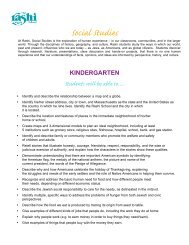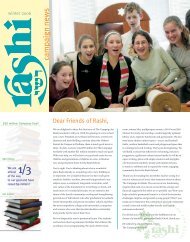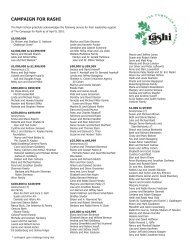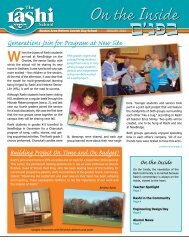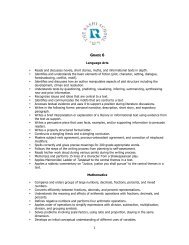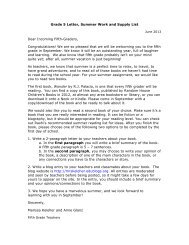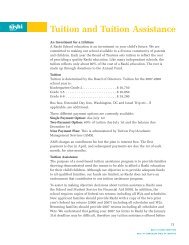Family Handbook - The Rashi School
Family Handbook - The Rashi School
Family Handbook - The Rashi School
Create successful ePaper yourself
Turn your PDF publications into a flip-book with our unique Google optimized e-Paper software.
While parents have the primary responsibility for the detection and treatment of head lice, we will work in a collaborative<br />
manner to assist all families to manage head lice effectively.<br />
More information about our pediculosis policy and procedure and treatment suggestions can be found on the <strong>Rashi</strong> website in<br />
the health section.<br />
<strong>School</strong> Attendance Guidelines: (When should you keep your child home from school?)<br />
Listed below are school attendance guidelines pertaining to some of the more commonly occurring illnesses. <strong>The</strong>se are only<br />
guidelines; every situation is different. Please call Mary Beth in the Health Office (ext. 7337) if you have concerns about<br />
sending your child to school.<br />
Fever: Any temperature greater than 100°F is considered a fever. Children must be fever-free for 24 hours without using fever<br />
reducing medications (Tylenol, Motrin, Advil) in order to return to school. This rule applies even if the underlying cause of the<br />
fever is non-infectious, such as middle ear infections, bronchitis, urinary tract infections, etc. Children with a fever do not<br />
usually feel well enough to participate in school activities. It is recommended that they be given 24 hours to recover from the<br />
fever before returning to school.<br />
Please note that a child who exhibits symptoms of illness without a fever may be sent home if the nurse feels this is in the best<br />
interest of the child or the child’s classmates.<br />
Colds: Children with an upper respiratory infection without a fever may attend school if they feel well enough to do so.<br />
It is helpful in preventing the spread of illness if children learn to cough or sneeze into their sleeve or use tissues to cover<br />
sneezes and coughs, and wash hands after contact with secretions.<br />
Infections: Any child who has been on antibiotic therapy for 24 hours is no longer considered infectious and may return to<br />
school. This includes infections of the eye, nose, skin, and strep infections. (Pink eye is the exception because not all doctors<br />
treat this condition, so the doctor or nurse will decide if exclusion is necessary to protect others from being contaminated.)<br />
Diarrhea: Children with diarrhea should remain home until they are symptom free for 24 hours. <strong>The</strong> only exception is if the<br />
diarrhea is the result of a chronic condition; then a note from the doctor is needed indicating that the diarrhea is not infectious.<br />
Vomiting: A child who has vomited the evening before or in the morning before school should remain home for that day.<br />
Common Childhood Diseases: Children diagnosed with chicken pox, measles, or any other known untreatable contagious<br />
disease must be kept home until they are no longer contagious. For most common childhood diseases, the period of contagion is<br />
known. Consult your physician /nurse for information.<br />
Medications: If your child is on medications at home but not at school, please let Mary Beth, the school nurse, know. Many<br />
medications cause unusual or undesirable side effects that can be mistaken for other problems.<br />
Call the school: It is important to call the main office if your child is going to be absent. You may be asked about the nature of<br />
your child’s illness and the expected duration of absence from school. If it becomes clear that your child will be away from<br />
school for longer than expected, telephone the school to explain any changes as soon as possible.<br />
Fitness & Health Program<br />
<strong>The</strong> purpose of the Fitness & Health Program is to provide learning opportunities for students to develop skills, knowledge<br />
and confidence, preparing them for life-long physical activity filled with enjoyment, fulfillment, self-expression and /or social<br />
interaction.<br />
• Kindergarten and first grade students attend four 25-minute Fitness & Health classes per week<br />
• 2nd – 4th grade students attend two 50-minute Fitness & Health classes per week<br />
• 5th – 8th grade students attend one 50-minute Fitness & Health class and one 50-minute fitness elective each week<br />
Kashrut Policy<br />
A <strong>Rashi</strong> education helps each student cultivate a personal understanding of Judaism and make decisions as to how to<br />
incorporate Jewish practice into his or her life. At the same time <strong>Rashi</strong> takes equal pride in creating an atmosphere of<br />
14



